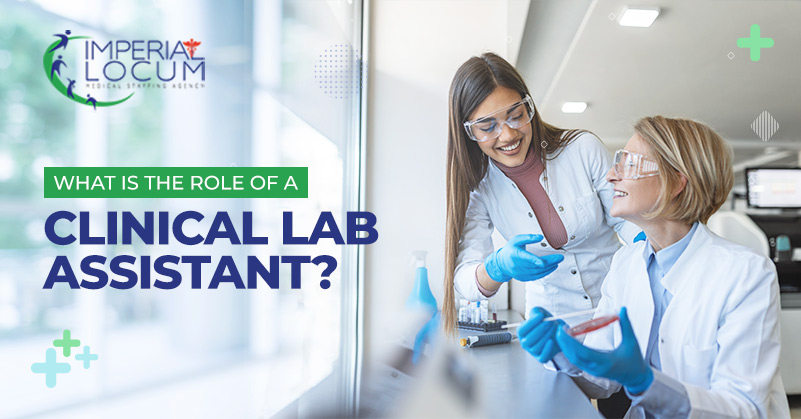Clinical lab assistants are the hidden heroes in healthcare. They work behind the scenes, but their role is important. Every test result a doctor uses to treat a patient starts with them. These professionals handle samples, support lab teams, and help deliver accurate results. Without their help, the healthcare system would slow down.

As more patients need testing and lab services, the demand for clinical lab assistants grows. If you’re looking for a stable, meaningful career in healthcare, this role could be a great fit.
Who is a Clinical Lab Assistant?
A clinical lab assistant, also known as a Laboratory Assistant or Medical Laboratory Assistant (MLA), is a trained healthcare worker who supports lab operations. They help medical technologists and lab technicians run tests, process samples, and manage lab data.
Their role is important in hospitals, clinics, and diagnostic laboratories, where accurate testing is necessary for the quality patient care. They make sure that the lab equipment is ready, samples are labeled, and test results are recorded correctly.
Many people confuse lab assistants with lab technicians. The main difference is in their responsibilities. Lab assistants handle prep work and support tasks. Lab technicians, on the other hand, perform more complex testing and analysis.
Both roles are important, but lab assistants are often the first step into a lab career.
What Does a Clinical Lab Assistant Do?
Clinical lab assistants perform major tasks that keep the lab running. They handle samples, prepare equipment, and support testing. Their role is to help doctors get accurate results faster.
Here’s what they do each day:
- Prepare samples for testing: They collect blood, urine, or tissue samples and prepare them for lab tests.
- Label and organize specimens: To avoid errors, each sample must be labeled clearly.
- Clean and sterilize lab tools: They clean glassware and lab machines after each use. According to the report by the World Health Organization (WHO) on decontamination and reprocessing of medical devices, proper cleaning and sterilization of lab tools after each use is necessary to prevent healthcare-associated infections. Healthcare facilities are required to adhere to strict hygiene standards through this process, which helps maintain patient safety and maintains hygiene standards.
- Log data into systems: Clinical Lab Technologists enter test details and results into the lab’s computer system.
- Support lab technicians: They assist with test prep and equipment setup.
- Handle basic administrative work: This includes filing reports and managing inventory.
- Follow safety rules: They wear protective gear and handle samples carefully.
A clinical lab assistant works to help labs stay safe, clean, and efficient. They ensure everything is ready so the team can focus on accurate testing.
Where Do Clinical Lab Assistants Work?
Clinical lab assistants work in many healthcare settings. Their skills are needed anywhere lab testing takes place.
Common workplaces include:
- Hospitals: They help process tests for patients in emergency and inpatient care.
- Diagnostic labs: These labs conduct tests for clinics, doctors, and health centers in delivering timely patient care.
- Private clinics: These labs conduct tests for clinics, doctors, and health centers in delivering timely patient care.
- Laboratories for research: Some assist with clinical studies and experimental testing.
- Blood banks: They label, store, and manage blood samples.
- Public health departments: The CLAs help track diseases and monitor health trends.
Clinical lab assistants handle different duties in each healthcare setting. But their primary focus stays the same, helping with lab tests and keeping patients safe. Imperial Locum has got you covered if you are looking for a high-paying locum tenens job as an experienced Clinical Lab Assistant.
Top 6 Skills and Traits Every Clinical Lab Assistant Needs
To succeed as a clinical lab assistant, you need more than training. You need the right mix of skills and traits. These help you work safely, stay organized, and support your team.
Major skills include:
- Attention to detail: Even tiny errors in labeling or recording can cause incorrect results. A CLA needs to have proper attention to detail as precision helps keep patients safe.
- Organization: Labs process hundreds of samples daily. A CLA needs to be organized, keep the work flowing, and prevent mix-ups.
- Teamwork: CLAs work side by side with lab techs, nurses, and doctors. Good teamwork ensures faster, safer care.
- Communication: A CLA needs to have proper communication, as clear updates and reports avoid confusion. It helps the whole team stay on the same page.
- Computer skills: As a Clinical Lab Assistant you enter test data into lab systems. Knowing how to use software speeds up your work and reduces errors.
- Time management: Lab tests are often time-sensitive. Managing your time properly as a CLA will keep things moving without mistakes.
- Safety awareness: CLAs handle blood, fluids, and tools. Following safety rules protects both you and the patients.
Education and Certification Requirements to Become a Clinical Lab Assistant
You don’t need a medical degree to become a clinical lab assistant. But you do need the proper education and training. This role is a great way to enter healthcare without spending years in medical school.
Here’s what most employers look for:
General Educational Development (GED) or High School Diploma or Certificate: This is the minimum educational requirement. Taking high school science courses like biology, chemistry, and math can give you a strong foundation for lab work.
Postsecondary certificate or diploma: Many clinical lab assistants complete a 6-12 month program through a community college or trade school. These programs teach lab safety, specimen collection, data entry, and basic lab procedures.
On-the-job training: Some facilities offer in-house training. You’ll learn to handle lab equipment, follow safety protocols, and assist with testing processes.
Certification (Optional but Recommended): Certification isn’t required in every state, but many employers prefer it. Being certified can help you get hired faster, qualify for better roles, and increase your earning potential.
If you’re a clinical lab assistant looking to grow in your career, temporary roles can be a great fit. Health staffing agencies can help you find locum tenens jobs tailored to your skills, goals, and schedule.
Helpful Read: How Temporary Assignments Cater to Different Career Phases?
6 Steps to Become a Clinical Lab Assistant
You don’t need years of schooling to start. Clinical lab assistants enter the field quickly. It’s a hands-on role with real impact. These lab Assistants are valued in the medical field for all the efforts they make in serving patient care. And it offers long-term career stability.
Whether you’ve just finished high school or want a fresh start, this guide will walk you through each step. Let’s begin.
Get to Know the Role
Before you start your journey as a Clinical Lab Assistant (CLA), take time to learn what the job is really like. Read job posts from hospitals, diagnostic labs, and clinics. These explain the daily tasks, tools you’ll use, and skills you’ll need. Talk to working lab professionals.
Ask about their routine, what they enjoy, and their challenges. These real stories can help you see if the role matches your goals and strengths.
Choose the Right Training Program
Research local community colleges or trade schools. Look for programs that offer:
- Hands-on lab training
- Phlebotomy basics
- Internships or clinical rotations
Make sure certification boards approve the program.
Enroll and Complete Your Coursework
Pick an accredited program. Make sure it fits your schedule and goals. Look for hands-on training options.
After you join, start learning the main topics you’ll use in the lab:
- Lab procedures
- Sample handling
- Medical ethics
- Infection control
According to the CDC report on infection prevention and control, learning lab procedures, sample handling, and medical ethics is necessary. These skills help ensure safety and accuracy in clinical labs.
Attend all your practical sessions. Employers value real-world lab experience.
Get Certified (Optional, but Competitive)
While not always required, national certification makes you stand out. Choose a certifying body based on where you plan to work.
Example: If you’re in the U.S., go for:
- AMT (American Medical Technologists)
- ASCP (American Society for Clinical Pathology)
- NHA (National Healthcareer Association)
Build Your Resume and Start Job Hunting
Create a clean, professional resume. Highlight:
- Your education and GPA (if strong)
- Internships or clinical practice
- Certifications
- Major traits include precision, clear communication, and strong organizational habits.
Apply to hospitals, diagnostic labs, and private clinics. Use job boards and health staffing platforms to find open roles. Be consistent with applications and follow-ups.
If you’re looking for temporary flexibility, a healthcare staffing agency can match you with locum tenens roles that suit your schedule and skills. These roles help you build experience. You also get to work in different healthcare settings.
Stay Updated and Grow
The moment you begin working, real success comes from always seeking ways to expand your knowledge and expertise. Take short certification courses, join workshops, and stay updated on new lab tools and techniques. This habit will boost your efficiency and job satisfaction.
In time, you can move into senior lab roles or specialize in phlebotomy, microbiology, or cytotechnology. These specializations often lead to higher pay and career stability.
Flexible assignments can also support your long-term goals. Locum tenens jobs let you grow at your own pace and prevent professional burnout.
Read Next: Locum Tenens as a Burnout Solution
Career Path and Growth Opportunities for Clinical Lab Assistants
Working as a clinical lab assistant is just the beginning. This role opens many doors in the healthcare field. With time, experience, and further education, you can advance your career or specialize in a specific lab work area.
Here’s what your career path might look like:
Start as a Clinical Lab Assistant
Starting as a clinical lab assistant is a smart first step in healthcare. This role offers a solid base and opens doors to many exciting career paths. As you gain experience, sharpen your skills, and pursue further education, you explore new areas within the lab setting.
Advance to a Medical Laboratory Technician (MLT)
In this role, you’ll handle samples, prepare lab equipment, and support the testing process. You’ll also interact with healthcare staff and sometimes with patients. This hands-on experience helps you build strong technical and communication skills. It’s the perfect starting point for a long-term career in the medical field.
Become a Medical Laboratory Technologist
Earning a bachelor’s degree in medical laboratory science opens the door to becoming a Medical Laboratory Technologist. In this role, you perform advanced testing, analyze results, and maintain accuracy. Additionally, you might manage lab operations or mentor junior team members. This stage advances your career toward leadership while keeping you connected to lab work.
Specialize in a Field
You can choose a focus area such as:
- Microbiology: Study and test for bacteria, viruses, and fungi.
- Hematology: Work with blood samples to detect disorders.
- Cytotechnology: Examine cells to spot early signs of disease.
- Histotechnology: Prepare and analyze tissue samples.
- Phlebotomy supervision: Lead and manage blood-drawing teams.
Specializing allows you to work in higher-demand areas.
Move into Leadership or Training Roles
Over time, you can grow into leadership positions. You might become a lab supervisor, manage teams, or take charge of quality control. These roles require strong communication, organization, and dedication. You can also share your knowledge by training new lab assistants or teaching in lab tech programs.
With experience, you can become:
- A lab supervisor or coordinator
- A quality control officer
- A trainer or educator in clinical lab program
Explore Related Careers
Some lab assistants move into roles like:
- Medical assistants
- Phlebotomy specialists
- Health informatics technicians
- Public health workers
Final Thoughts: Is a Clinical Lab Assistant Career Right for You?
To sum it up, if you enjoy medical work, this career might suit you well. As part of the lab team, clinical lab assistants support patient care every day. From handling samples to aiding staff, they help deliver accurate and on-time test results.
You don’t need years of schooling to get started. What matters most is the right training, a focus, and a keen eye for detail.
This path is perfect for those who:
- Desire a stable future with career progress
- Like the idea of working in a clean, controlled lab setting
- Hope to leave a meaningful mark in healthcare
- Succeed under pressure and prefer staying organized
A clinical lab assistant career isn’t just a job. It’s a step into the medical field—with room to learn, grow, and build a meaningful future.
Ready to earn more with premium perks? Join Imperial Locum and take the next step in your career. Contact us now!

